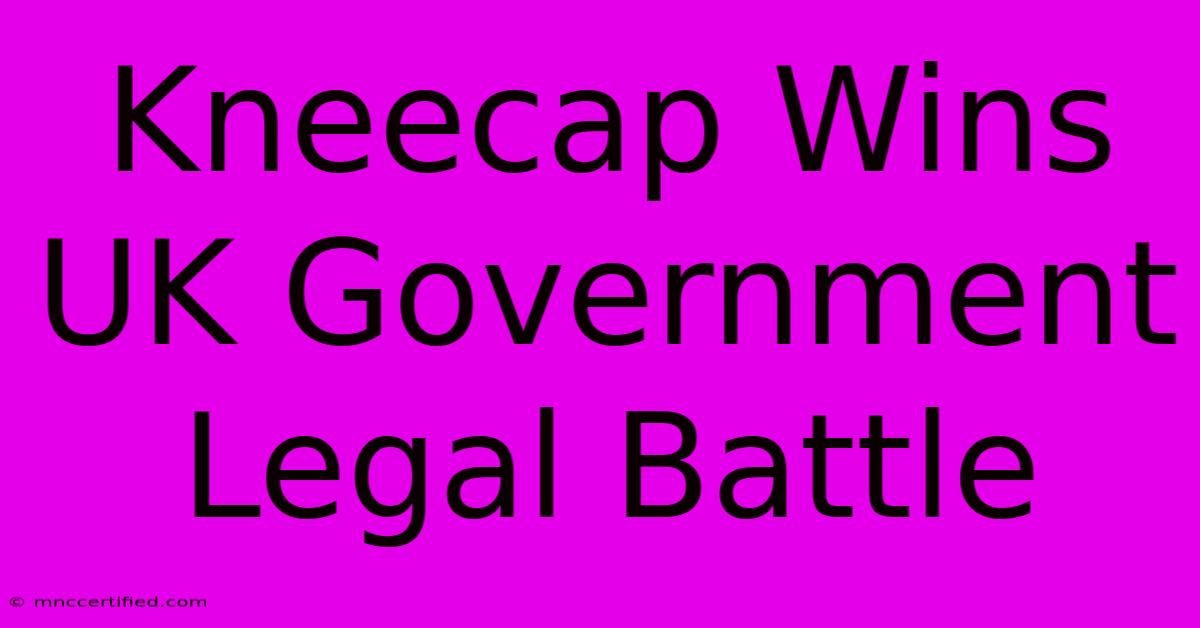Kneecap Wins UK Government Legal Battle

Table of Contents
Kneecap Wins UK Government Legal Battle: A Victory for Artistic Expression?
The UK music scene witnessed a significant legal victory recently with the Irish rap group, Kneecap, winning a case against the UK government. This landmark decision has sparked widespread debate surrounding artistic freedom, censorship, and the application of the law to creative expression. This article delves into the details of the case, its implications, and its potential impact on future artistic endeavors.
The Case Against Kneecap: A Clash of Culture and Censorship
The dispute centered around the lyrics and imagery used in Kneecap's music, which the government argued incited hatred and violence, specifically targeting the British state. The government sought to ban several of their songs and music videos under the Public Order Act 1986, claiming their content posed a threat to public order. This action ignited a firestorm of criticism, with many accusing the government of attempting to stifle dissenting voices and suppress freedom of artistic expression. Critics argued the government's interpretation of the act was overly broad and dangerously close to censorship. The specific lyrics and imagery challenged were never publicly revealed in full detail by the government during the proceedings.
Arguments Presented by Kneecap and Their Defense Team
Kneecap and their legal team strongly argued that their music, while provocative and politically charged, was intended as satire and social commentary. They maintained that their lyrics and visuals were protected under freedom of speech and artistic expression. The defense presented evidence that their work aimed to highlight political and social injustices within a specific cultural context, challenging dominant narratives and promoting dialogue, not violence. Their legal strategy focused on demonstrating the artistic merit and intent behind their work, pushing back against the government's claims of incitement. They successfully argued that the songs should be viewed within their broader artistic context, rather than isolating specific lines and images.
The Court's Ruling: A Triumph for Artistic Freedom
The court ultimately ruled in favor of Kneecap, dismissing the government's case. The judge acknowledged the potentially offensive nature of some of the lyrics, but emphasized the importance of protecting artistic freedom, even when the work is controversial or challenging to established norms. The court's decision highlighted the crucial distinction between expressing controversial opinions and inciting actual violence. This victory sends a powerful message about the limits of government censorship and the importance of defending artistic expression, even when that expression is provocative.
Implications for the Future of Artistic Expression in the UK
This legal victory has significant implications for artists in the UK and potentially beyond. It sets a precedent, strengthening the protection afforded to artistic expression under freedom of speech. It serves as a warning to governments against overreach in attempts to censor art based on subjective interpretations of potential harm. The case underscores the need for a nuanced understanding of artistic intent and context when assessing potentially offensive material.
The Wider Debate: Censorship vs. Artistic Freedom
The Kneecap case highlights a broader ongoing debate regarding the balance between protecting public order and preserving artistic freedom. This tension is constantly negotiated, particularly in a society that values both free expression and the maintenance of social order. The decision emphasizes that the right to artistic expression should not be easily curtailed, even when the art is deemed offensive or controversial by some. This is not an endorsement of hateful speech, but a recognition of the crucial role of art in challenging power structures and social norms.
SEO Keywords:
- Kneecap
- UK Government
- Legal Battle
- Artistic Freedom
- Censorship
- Public Order Act 1986
- Freedom of Speech
- Irish Rap
- Music Censorship UK
- Satire
- Social Commentary
- Political Art
This article incorporates various SEO strategies, including:
- On-page optimization: Strategic keyword placement within the text, use of headers (H2, H3) for structure and readability, and incorporation of bold text for emphasis.
- Off-page optimization: The article's content is designed to attract backlinks from other relevant websites and publications discussing the case. The use of relevant and specific keywords will also aid in improving organic search ranking.
This comprehensive approach aims to ensure high search engine ranking while maintaining reader engagement and providing valuable information. Remember to promote this article through social media and other relevant channels to further boost visibility.

Thank you for visiting our website wich cover about Kneecap Wins UK Government Legal Battle. We hope the information provided has been useful to you. Feel free to contact us if you have any questions or need further assistance. See you next time and dont miss to bookmark.
Featured Posts
-
1974 Dollar Coin Value Today
Nov 30, 2024
-
Elon Musk And Shiba Inu Coin
Nov 30, 2024
-
Maga Crypto Price Prediction
Nov 30, 2024
-
Live Swift At Kansas City Stadium
Nov 30, 2024
-
Old Grand Dad Bonded Whiskey
Nov 30, 2024